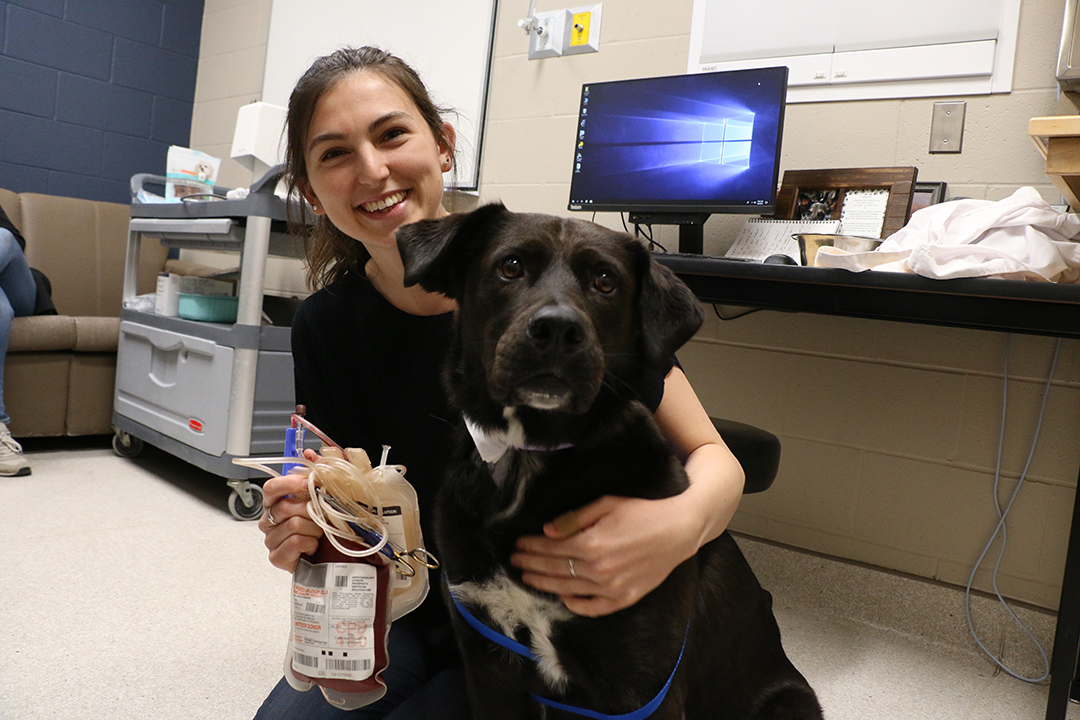
Blood donation program for pets seeks volunteers
When Emma Thomson adopted Asha from a local shelter, she wasn’t expecting to come home with a dog that day — let alone one that would become a life-saving support for other animals.
By Jeanette NeufeldFour-year-old Asha, a female mixed breed dog, is one of the first pets to join the Western College of Veterinary Medicine (WCVM)’s revamped blood donor program.
Thomson, now a fourth-year veterinary student, had just adopted Asha when she took part in the first blood donor clinic run by the WCVM’s Emergency and Critical Care student club, a key part of the new program. Thomson is president of the club, brought Asha to the event. That’s where she realized her new dog had the ideal blood type (negative) to become a canine blood donor.
“For me, being her owner, I love when she comes to donate. I think it’s great that we can help out … it’s kind of her way of giving back,” says Thomson.
People might be surprised to learn that pets require blood donations, and they might be more surprised to learn that their own pets could also become life-saving blood donors.
“A lot of the cases that come into emergency do require blood,” says Dr. Jennifer Loewen, an assistant professor and an emergency and critical care specialist at the WCVM’s Veterinary Medical Centre (VMC).
Pets may need blood transfusions for various reasons including trauma, ruptured tumours or an illness that causes the body to attack its own red blood cells.
“The blood donor program is very important for our patients,” says Dr. Valerie MacDonald-Dickinson, an associate professor of veterinary medical oncology at the WCVM. “It’s also important for our referring veterinarians in the city and beyond who refer patients in need of a blood transfusion.”
The VMC previously relied on pets owned by staff and faculty at the college. But an increased need for blood products at the veterinary teaching hospital has led to an expanded search for donors across campus.
What makes a good donor?

Ideal donors are cats and dogs between one and eight years of age and that are in lean body condition. Cats must weigh more than five kilograms, be easy to handle and be kept indoors. Dogs must weigh over 23 kilograms, and their owners must know their pets’ travel and vaccination histories. Female dogs must be spayed.
Like people, cats and dogs also have blood types. Cats have three different blood types and feline patients must receive blood products from the same blood type. Like humans, dogs have a “universal” blood type — that’s why clinicians prefer “negative” dogs like Asha since their donated blood products can help canine patients with positive or negative blood types.
One donation given by a dog can usually save two to three lives, depending on the size of dog receiving a transfusion. Typically a feline donation will be used by only one cat.
Owners who enrol their pets in the program must commit to four scheduled donations per year, with up to two additional emergency donations. Pets must be brought to the VMC, where donating appointments take up to two hours.
Donors receive free vaccinations, bloodwork and infectious disease screening. Dogs also receive plenty of treats during and after the donation process. Owners receive the satisfaction of knowing they helped save lives.
“The owners of our blood donors want to help other pets. They have a great love of animals, and they previously may have needed blood for their own pet in the past and want to give back because of that,” says MacDonald-Dickinson.
“They may be human blood donors themselves, and on a volunteer basis. They want to contribute to animal welfare and the overall well-being of pets.”
For more information about this program, visit this link or email pawsblooddonor@usask.ca.
